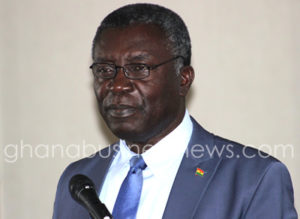Minister appeals to youth to take interest in Biosphere Reserves
 Professor Kwabena Frimpong-Boateng, Minister of Environment, Science, Technology and Innovation (MESTI), has appealed to the youth to take interest in activities relating to the Biosphere Reserves concept and support its active implementation through schools educational programmes.
Professor Kwabena Frimpong-Boateng, Minister of Environment, Science, Technology and Innovation (MESTI), has appealed to the youth to take interest in activities relating to the Biosphere Reserves concept and support its active implementation through schools educational programmes.
Biosphere Reserves are a special type of protected areas that draws attention to the connections and potential compatibility between people and nature, bridging conservation and development agenda.
“Let us be reminded that the term Biosphere Reserve is not just a designation or an international recognition, it is a long-term commitment, a responsibility and a long-term project that must be supported.
“It must be carried out by all stakeholders, and political leaders should endeavour to provide financial support and political will for biosphere reserve activities,” Prof Frimpong-Boateng stated at Ada.
Prof. Frimpong-Boateng stated in a speech read on his behalf at the opening of the Second Ghana National Forum on Biosphere Reserves and Sustainable Development at Ada in the Greater Accra Region.
He said: “An ecosystem is a dynamic complex of plant, animals, and microorganism communities and the non-living environment, interacting as a functional unit. We humans are integral parts of ecosystems.”
He explained that the ecosystem services were the benefits people obtain from ecosystems.
Prof Frimpong-Boateng said Ghana had played an active role in maintaining this balance and particularly in the implementation of the UNESCO Man and the Biosphere (MAB) Programme since its inception nearly 50 years ago and currently contributes three biosphere reserves to the world network: Bia, Songor and Lake Bosomtwe.
Dr Henry Kwabena Kokofu, MAB National Committee Chairman, and Executive Director Environmental Protection Agency (EPA) said the MAB programme had used knowledge from diverse backgrounds to improve human livelihood and efficiency in the management of natural resources across the world.
He said they were actively exploring various avenues to provide support for the three reserves in Ghana and also add other potential sites as Biosphere Reserves.
The EPA Executive Director said: “Currently, with the help of The National Commission for UNESCO, we are about to construct a Model Bead Production Centre here in Ada which will empower women in Ada and its environs to use waste glass to produce beads for local and international sale”.
“In Bosomtwe, we are working closely with our German counterparts in Lake Schalsee to build a tourist information centre. In Bia, the MAB secretariat will provide technology to the 220 beneficiaries of the Green Economies in Biosphere Reserve project which ended a few years back.”
Mrs Cynthia Asare-Bediako, the Chief Director, MESTI, inaugurated the Ghana MAB Youth Network.
Mr Ebenezer Appah-Sampong, Deputy Executive Director, EPA, said the MAB Youth were committed to biodiversity conservation.
Madam Sarah D. Pobee, District Chief Executive for Ada East, said the District Assembly would continue to play the facilitating role in championing the Biosphere Reserve concept and Sustainability of the Songhor.
Nene Obechere III, Mankralo of Ada, said man’s relationship with nature were interdependent; hence, there was the need for man to do things in a way that preserve and protect nature.
The MAB Programme aims at promoting interdisciplinary and applied research in vital ecosystems to achieve sustainable human-ecosystem interaction.
At the national level, the programme is being implemented by MAB National Committees.
The National Forum on Biosphere Reserve and Sustainable Development was introduced in 2018 and used to launch the Ghana Action Plan for the MAB programme 2018-2020, the local version of the Lima Action Plan for the World Network of Biosphere Reserves (2016-2025).
The Ada meeting was on the theme: “Ecosystem Services and Benefit Sharing in UNESCO Biosphere Reserves – Our Role as Stakeholders”, was organized by the Ghana MAB National Committee in collaboration with EPA and UNESCO.
UNESCO Biosphere Reserves are areas of terrestrial or coastal/marine ecosystems, which provide opportunities for conservation of biodiversity (through protection, research, monitoring, training and education) while ensuring sustainable use for the benefit of the local communities.
With the World Network comprising 714 sites in 129 countries, the MAB programme continues to grow and contribute to the improvement of the lives of people and their relationships with one another and with nature.
Source: GNA
